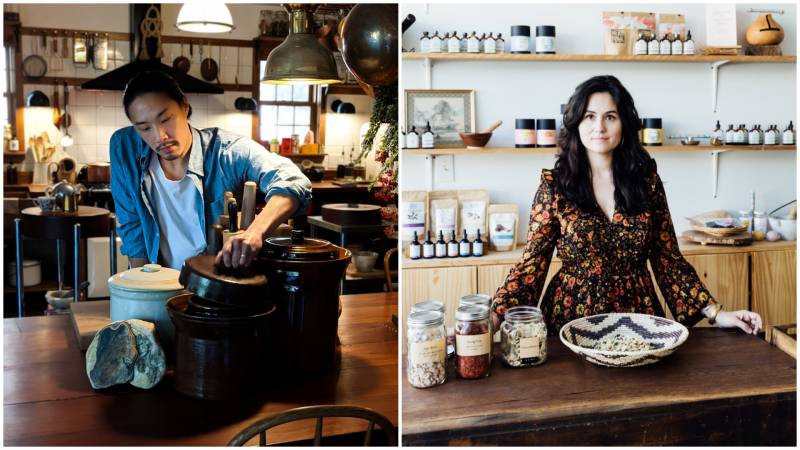Episode transcript here. This interview has been edited for length and clarity.
‘The Hearth and Home’
Cathy Erway: Adrian Chang — on Instagram as @mykitsunecafe — and Erin Wilkins started up a workshop series about herbalism and folk traditions. It’s over Zoom, and they summarize it as “traditions that have to do with the hearth and home.’”
Adrian has walked us through kombu, which is a dried seaweed or kelp; he made a dashi stock, and he’s walked us through all of the energies of the winter vegetables. There’s a lot of cooking, some herbalism, and general wisdom around everyday living. It’s rooted in Eastern philosophies and Traditional Chinese Medicine, which is the bedrock of a lot of Eastern medicine.
How Cathy Found Kitsune Cafe
I wanted to know more about my heritage and my culture. I grew up with parents who practice qigong. They go to a Chinese medicine doctor when they need something to treat an ailment. But I felt like I didn’t really tap into that very well, and I have a lot of guilt around that.
I’d been wondering if anyone was doing something around Traditional Chinese Medicine, but I also love that they were taking it in an Asian American direction. They were acknowledging that we live in America, and we may be somewhat divorced from some of these traditions. That really spoke to me.
Adrian’s story is so fascinating because he grew up going to his grandfather’s apothecary shop in San Francisco Chinatown all the time, which was a Chinese apothecary.
“I remember floor to ceiling apothecary cabinets. We did not grow up traditional. I don’t even speak Chinese. I don’t speak Mandarin, Cantonese or any dialects of my family. After growing with that mentality, I viewed people like my grandfather and his herb shop as not bad at all, but just so foreign” — Adrian Chang of Kitsune Cafe
It’s that classic story which comes around full circle. And now he’s trying to pick up the pieces and reclaim this heritage.
But it’s not like a tidy ending there. You know, Adrian will be the first to say that he’s constantly learning. He’s constantly evolving. We’re all on this journey.
The 1974 Case of Miriam Lee
Miriam was moonlighting as an acupuncturist while she worked in the Hewlett Packard factory in the Bay Area. She learned the ropes of acupuncture from this master acupuncturist in Shandong, so her services to the community were so welcome. It answered a huge need in that area.
The trial really publicized the idea of acupuncture, and it was recorded in newspapers that hundreds of her patients showed up to her trial to protest her arrest.
Miriam Lee is seen as a real legend and a pioneer in Traditional Chinese Medicine. She went on to found the Acupuncture Association of America. From there she ended up teaching most other acupuncturists in America.
The irony is that now it’s a profession that you can go to a major college or university and get a degree in and spend a lot of money on, too.
After the Trial: The Modern Day Perception of Traditional Chinese Medicine
It’s a really strange juxtaposition. Erin Wilkins has said that these services can be really expensive when you go to somebody who is accredited with a clinical acupuncture degree and practice. The access issue was something that really troubled her. And I can totally see why.
This was something that used to be done by well-trained people. It was passed around from one master to an apprentice by oral tradition. Now it’s something that has been institutionalized. That’s one of the reasons why Erin Wilkins wanted to do these workshops: to make it more accessible and affordable.
Looking to the Future
Honestly, there’s a sense of pride [around Traditional Chinese Medicine] because it comes from this realization that your elders had so much to offer. I think it just goes to show that Asian Americans have a lot to be proud of.
And that’s the other point about “Asian American-ness” — I think these workshops do a really great job of making clear that even if you’re not Asian American, we are all American. Let’s bring in our shared background in this context.
I think that the biggest takeaway is that we can be on these different wavelengths of expertise, of interest, and we can continue to learn from others through a community that we forge. I just love that we can be real about that, and not feel like we have to be an expert. And find those connections between various different cultures and their roots — their heritage — when it comes to food and medicine.

